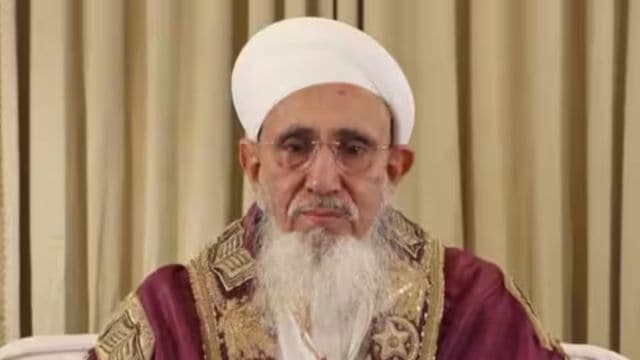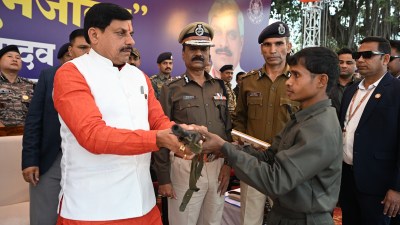Bombay High Court rules in favour of Dawoodi Bohra community leader Syedna Muffadal Saifuddin in succession suit
In 2014, after Syedna Muffadal Saifuddin succeeded his father, his half-brother Khuzaima Qutbuddin challenged it in the Bombay High Court.
 His Holiness Syedna Mufaddal Saifuddin, the 53rd al-Dai al-Mutlaq. (Image Credit: Jamia Millia Islamia)
His Holiness Syedna Mufaddal Saifuddin, the 53rd al-Dai al-Mutlaq. (Image Credit: Jamia Millia Islamia)The Bombay High Court on Tuesday dismissed a suit challenging Syedna Muffadal Saifuddin’s position as the spiritual head of the Dawoodi Bohra community by his challenger Syedna Taher Fakhruddin, a decade after the suit was filed.
Over a year after it concluded the hearing and reserved its verdict, Justice Gautam S Patel passed a judgment in the dispute between Syedna Mufaddal Saifuddin and his challenger Syedna Taher Fakhruddin. After hearing the arguments in the suit for final disposal since November 2022, Justice Patel concluded the hearing on April 5, 2023.
While pronouncing the verdict on Tuesday, Justice Patel clarified he has kept the verdict “as neutral as possible for personalities involved” as ‘feelings will run high’ and he has decided the issue “on proof and not faith”.
After the verdict, the Dawoodi Bohra community issued a press release praising the “landmark judgement”.
“The Dawoodi Bohra community is most gratified by the passing of this landmark judgement in what is a historic and defining moment for the community… We have always believed and have had full faith and conviction in the Indian judiciary, which has time and again affirmed the position of the Syedna and the Dawoodi Bohra community’s age-old beliefs, customs, practices and doctrines,” said the press release.
A religious denomination among Shia Muslims, the Dawoodi Bohras are traditionally a community of traders and entrepreneurs. The top religious leader of the community is known as the Dai-al-Mutlaq. There are five lakh Dawoodi Bohras in India and over 10 lakh world over.
In 2014, the 52nd Dai-al-Mutlaq, Syedna Mohammad Burhanuddin, passed away, and his son, Mufaddal Saifuddin, succeeded him. This was challenged by Syedna’s half-brother, Khuzaima Qutbuddin, in the Bombay High Court. After Qutbuddin died in 2016 in the US, his son, Syedna Taher Fakhruddin, became the plaintiff and wanted to be declared the leader of the Dawoodi Bohras by the High Court. Fakhruddin claimed his father conferred the nass or the conferment of succession upon him and thus he should be declared the Dai.
As per faith and Dawoodi Bohra doctrine, a successor is appointed through “divine inspiration”. A nass can be conferred upon any deserving member of the community and not necessarily a family member of the current Dai, although the latter is often the practice.
While deciding issues framed in the matter, Justice Patel held the suit was maintainable and reliefs prayed for by the plaintiff were not barred by the provisions of the Maharashtra Public Trusts Act, 1950. Justice Patel added the plaintiff did not prove a valid nass was conferred/pronounced on him as stated in the plaint. Justice Patel also held the plaintiff could not prove whether nass once conferred cannot be retracted, revoked, changed or superseded. The Court added the defendant proved that a valid nass was conferred on him by the 52nd Dai.
In his suit filed in 2014, the original plaintiff Qutbuddin had sought from High Court to restrain the late Syedna’s son from acting as the Dai alleging that Syedna Mufaddal Saifuddin had taken over the leadership role in a “fraudulent manner”. Qutbuddin claimed that after Burhanuddin became the new Dai-al-Mutlaq, taking over from his father Syedna Taher Saifuddin in 1965, he had publicly appointed his half-brother as the mazoon or the second in command and privately anointed him as his successor through a secret nass before the mazoon announcement on December 10, 1965.
Fakhruddin, through Senior Advocate Anand Desai, had claimed his father conferred the nass upon him and thus he should be declared the Dai.
Representing Saifuddin, Senior Advocates Iqbal Chagla, Janak Dwarkadas, and Fredun Devitre argued the nass of 1965 lacked witnesses and could not be accepted. They argued that as per established and prevalent doctrines of the Dawoodi Bohra faith, nass could be changed and revoked. Saifuddin had also contended that even if nass had been conferred on the original plaintiff in 1965, as per the doctrinal belief of the community, only the last nass would be valid, therefore he was rightfully conferred to be Syedna.
Dwarkadas also questioned the silence maintained by Syedna Qutbuddin about his claim to the post of Dai between 2011 and 2014, and said he only made the claim after the Dai’s demise as an “afterthought.” However, Desai submitted that the four nass on the defendant did not take place and were concocted.







